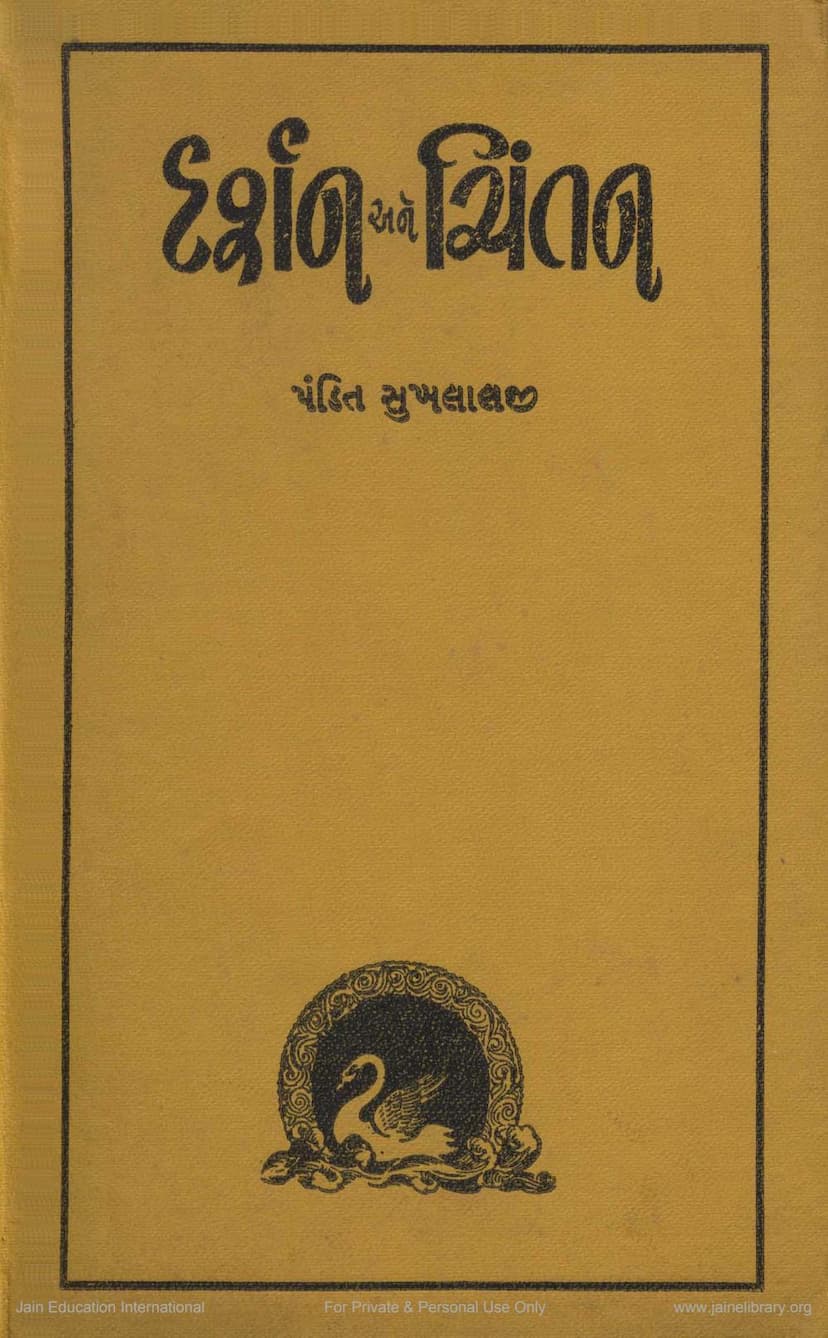Darshan Ane Chintan Part 2
Added to library: September 1, 2025

Summary
Here's a comprehensive summary in English of the provided Jain text, "Darshan ane Chintan Part 2" by Sukhlal Sanghavi, based on the provided pages:
Book Title: Darshan ane Chintan Part 2 (Vision and Contemplation, Part 2) Author: Pandit Sukhlal Sanghavi Publisher: Pandit Sukhlalji Sanman Samiti Ahmedabad Catalog Link: https://jainqq.org/explore/004635/1
This document is the second volume of a collection of Gujarati articles by Pandit Sukhlal Sanghavi, compiled and published by the Pandit Sukhlalji Sanman Samiti in Ahmedabad. The first volume contained the initial two sections of his writings and the first 14 articles of the third section. This second volume contains the remaining articles from the third section ('Parishilan' - Review/Study), the entire fourth section ('Darshanik Chintan' - Philosophical Contemplation), the fifth section ('Adhyayan' - Study/Discipline, though the provided index only lists titles related to philosophical thought and critique), and the seventh section ('Atmanivedan' - Self-Revelation).
The collection is structured into seven main sections:
- Samaj ane Dharm (Society and Religion)
- Jain Dharma ane Darshan (Jain Dharma and Philosophy)
- Parishilan (Review/Study)
- Darshanik Chintan (Philosophical Contemplation)
- Arth (Meaning/Economics - no specific titles provided in the index snippet)
- Pravasakatha (Travelogue)
- Atmanivedan (Self-Revelation)
Key Content Highlights from the Provided Pages:
The majority of the provided pages detail the Table of Contents for the second volume, outlining the specific articles within the latter sections. These articles cover a range of topics, showcasing Pandit Sukhlalji's diverse intellectual interests and his deep engagement with Jainism, Indian philosophy, and broader cultural and intellectual discourse.
Key Themes and Articles:
-
Jain Literature and Philosophy: Several articles delve into the specifics of Jain literature and philosophy, including:
- "Who is the Author of the Avashyaksutra?" (Investigating the authorship of a key Jain text).
- "Hetubindu no Parichay" (Introduction to Hetubindu, likely a Jain philosophical work, with extensive discussion of its manuscripts and scholarly work surrounding it, attributed to Dharmakirti and commented upon by Arhat and Durveka Mitra).
- "Sammati Tark ane Teno Mahatva" (Sammati Tark and its Importance, by Acharya Siddhasena Divakara, highlighting its significance in Jain logic and philosophy).
- Discussions on Jain logic and epistemology, including the concept of Anekantavada (Non-one-sidedness), presented in the article "Jivata Anekant" (Living Anekant).
- An analysis of "Jain Nyay ne Kramik Vikas" (The Gradual Development of Jain Logic).
-
Philosophical Contemplation: This section includes profound reflections on:
- "Bharatiya Darshane ma Adhyatmik Vikas Kram" (The Spiritual Development Process in Indian Philosophies), comparing various Indian traditions.
- "Praman Svatatva ke Paratah?" (Is Authority Intrinsic or Extrinsic?), a philosophical inquiry into the source of valid knowledge.
- "Gujarati Bhasha ma Darshanik Tattvagnan" (Philosophical Knowledge in the Gujarati Language), discussing the development of philosophical discourse in Gujarati.
- "Samabhangi" (Equality/Equanimity), presented as a letter to a student.
- "Nigad Jati na Jivasamuh Vishayak Prashnottare" (Questions and Answers regarding Nigad class of beings), likely a discussion on specific Jain cosmological or biological concepts.
- "Stri Jati ne Drishtivad Ang Bhanvana Nishedh par Ek Vichar" (A Thought on the Prohibition of Studying Drishtivad for Women), addressing societal and scriptural views on women's access to certain religious texts.
-
Review and Critical Analysis: Pandit Sukhlalji engages in critical reviews of various works and personalities, demonstrating his scholarly depth:
- "Srimad Rajchandra – Ek Samalochana" (Srimad Rajchandra – A Critique) and "Srimad Rajchandra ni Atmavishad" (Srimad Rajchandra's Self-Realization/Philosophy of the Self), offering a critical yet appreciative analysis of the influential Jain spiritual figure Srimad Rajchandra.
- Critiques of works by other prominent figures like Nanabhai Bhatt and Chunilal Vardhaman Shah, and introductions to books by 'Dashak' and Mohanlal Mehta 'Sapan'.
- "Sarvangin Sanshodhan ane Samalochana" (Comprehensive Research and Critique), a preface to Dr. Dhirubhai Thacker's book on Manilal Nabhanbhai's literary journey.
-
Social and Cultural Commentary: The collection also touches upon social issues and cultural observations:
- "Vikas nu Mukhya Sadhan" (The Primary Means of Development), reflecting on the factors driving progress, likely emphasizing intellectual or spiritual development.
- "Unch Shikshan ni Bodhbhasha no Prashna" (The Question of the Medium of Instruction in Higher Education), addressing the language policy for higher education in Gujarat.
- "Stri-Purush na Balabal ni Mimansa" (Analysis of the Strength of Women and Men), a comparative study of gender capabilities.
- "Samaj ane Dharm" (Society and Religion) articles likely discuss the interplay and mutual influence between societal norms and religious practices.
- "Santosh ane Tyag nu Swarupa" (The Nature of Contentment and Renunciation).
- "Vivah Vichar" (Thoughts on Marriage).
- "Samabhangi" (On Equality).
-
Travelogues: Articles like "Mangalyatra" (Auspicious Journey), "Shantiniketan" and "Marā Punjab no Pravas" (My Punjab Journey) showcase his experiences and observations during travels.
-
Autobiographical and Personal Reflections: Section 7, "Atmanivedan," includes personal reflections, such as "Abhyas Dasha na Ketlak Smarane" (Some Memories from My Study Period) and "Mara Jivan ma Prakash nu Sthan" (The Place of Light in My Life), offering glimpses into his personal life and intellectual journey.
Overall Significance:
This second volume of "Darshan ane Chintan" further elaborates on Pandit Sukhlal Sanghavi's extensive contributions to Jain literature, philosophy, and critical analysis. The articles reflect his deep scholarship, his commitment to reasoned inquiry, and his ability to engage with complex philosophical and social issues with clarity and insight. The collection serves as a valuable resource for understanding Jain philosophy, the history of Indian thought, and the intellectual landscape of Gujarat during his time. The specific mention of discussions on Anekantavada, Hetubindu, Sammati Tark, and the critical analysis of figures like Srimad Rajchandra highlight his dedication to these crucial areas of study.